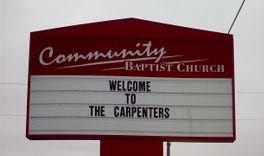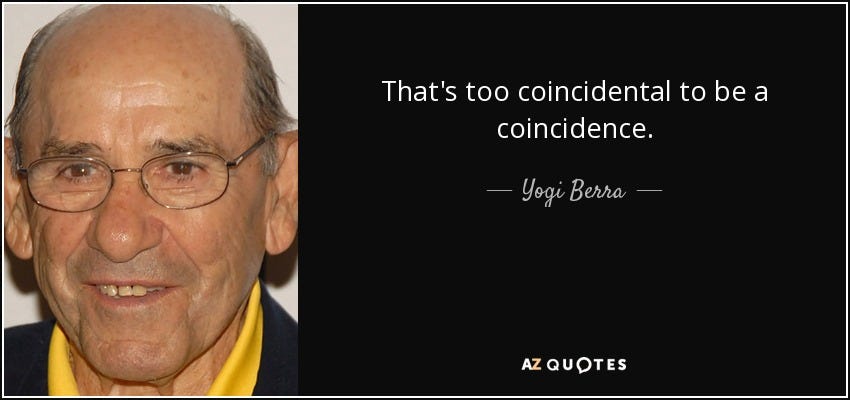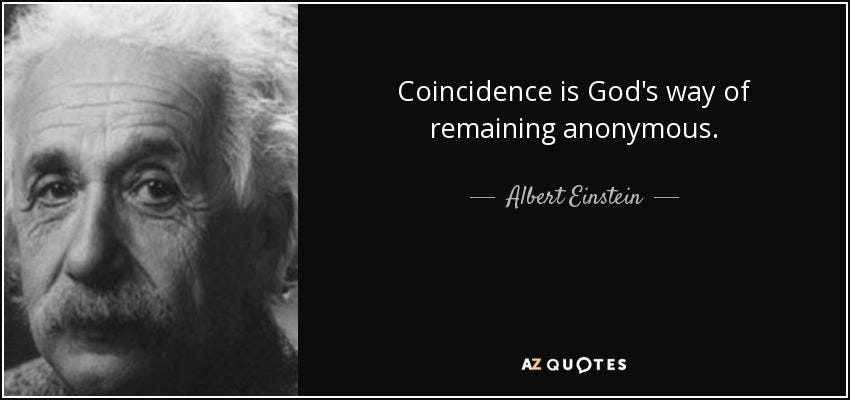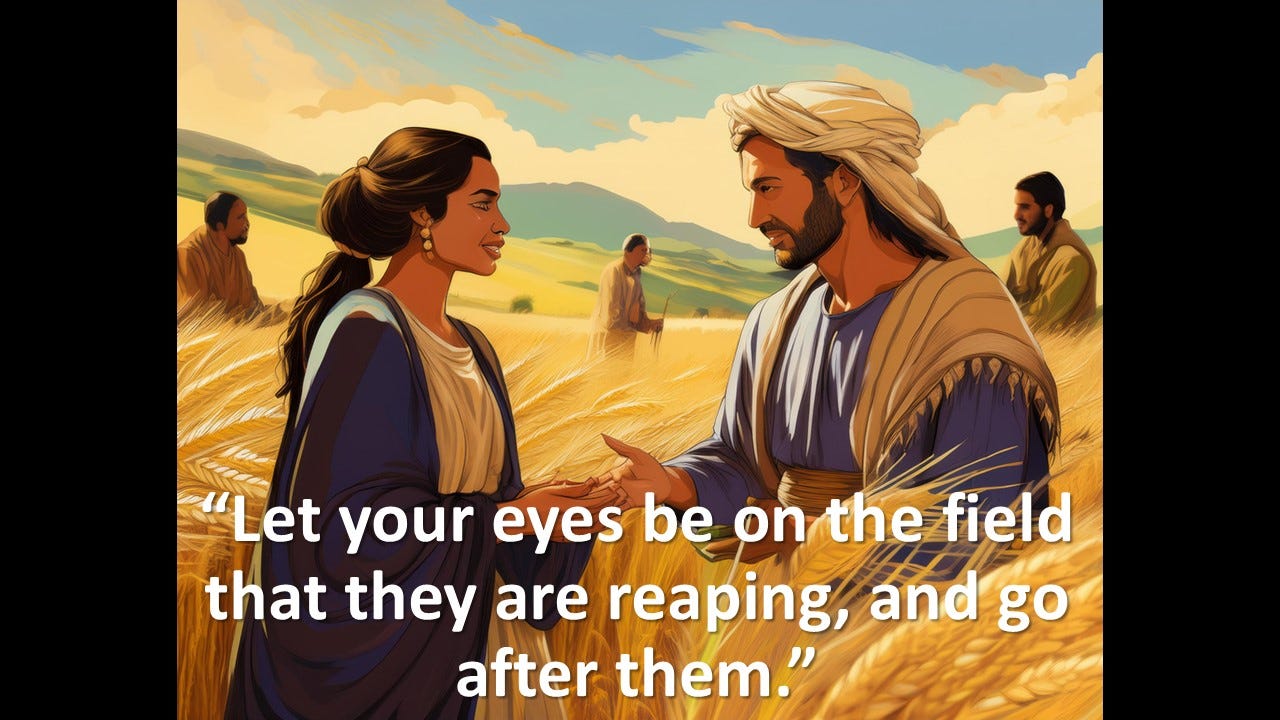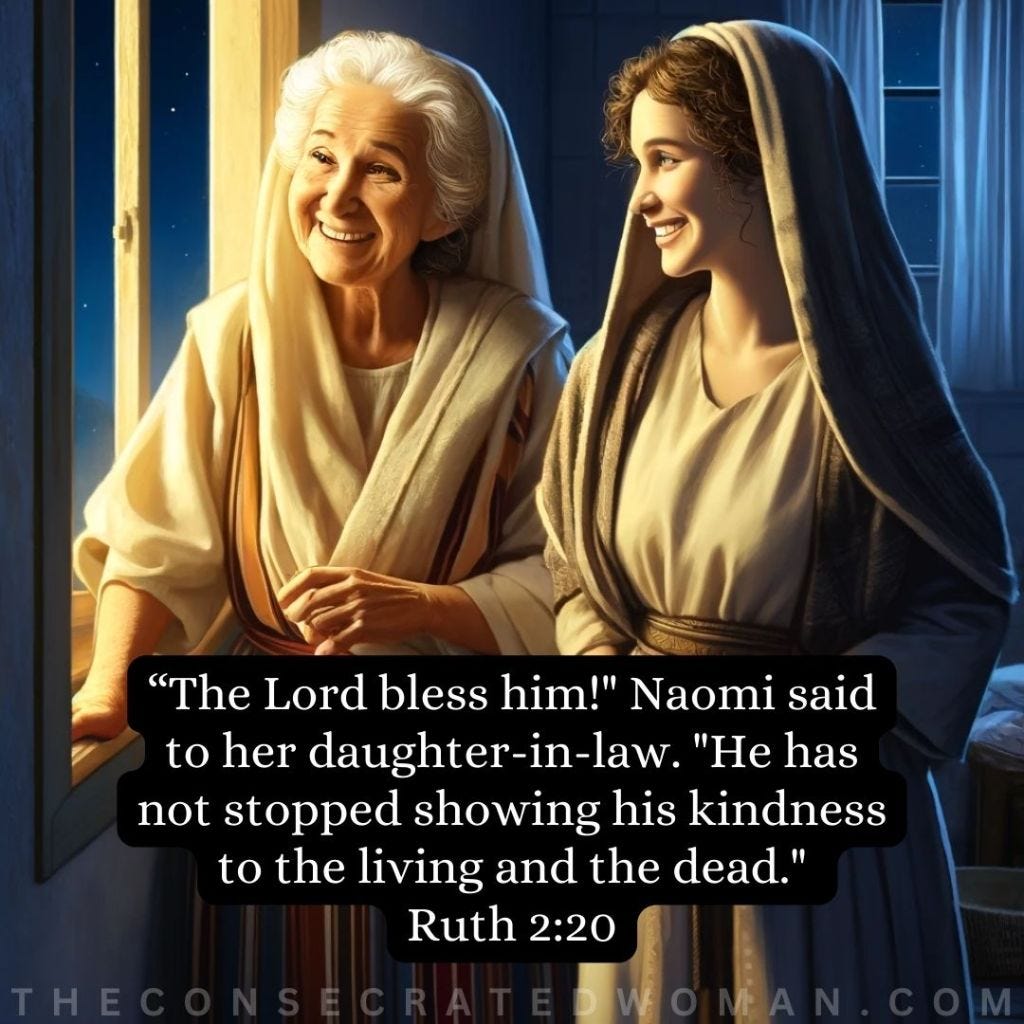Too Coincidental
From an exposition on Ruth 2
Ever had a coincidence? Maybe something too coincidental to be just chance? The choice, at another church, that led to Covenant Reformed Baptist Church, was framed, by the insistence of others (not me), as between “Stay” and “Go”; that is, people at another church were asked to vote for “Stay” or “Go.” “Go” won which led to the question should we (my family) go elsewhere, move away. As we were reorganizing and very busy with looking for a place to live, moving, everything, having been told by people to go, I decided to redo a series of sermons I had done earlier on 1 Timothy, also convenient because it’s about organizing the church and we were looking into whether we should start a new church, this one. I opened the computer file with my sermon notes on it, just a day or two after the “stay” or “go” vote, having forgotten what I originally, several years earlier, had entitled the first sermon from 1 Timothy 1. To my surprise, my shock, I’ll never forget when the file opened and I saw that it just happened to be called . . .
“Stay.”
As Yogi Berra said, “That’s too coincidental to be a coincidence.”
For the full exposition of Ruth 2, click on the YouTube link below.
Albert Einstein said, “Coincidence is God’s way of remaining anonymous.” Maybe that’s sometimes true but some coincidences, like those that led to this church, aren’t really anonymous at all. They’re God’s way of saying He’s in control, even over things that appear out of control. Coincidences are God’s providence that are right on the border with being miraculous. There’s nothing about just happening to sit in front of the son of a favorite professor from 30 years earlier in California and interim pastor at your church almost 20 years earlier in Kentucky; or the title of the sermon just happening to be the same word in the church vote a few days before that conveys the message you desperately need; there’s nothing about that that denies the laws of nature, that’s technically supernatural but, still, it’s too coincidental to be a coincidence.
Modern people think that if God is in control so that every “this or that” is under the Lord’s control (James 4:15) — like how people would choose to frame a church vote — then people are just puppets and not exercising “free will.” Modern people assume that there must be a conflict between God’s control and free will. But both can be true at the same time. People can make free choices and those choices be determined by God. We see that in Ruth 2, where Ruth randomly chooses which field to go to and “just happens” to come to Boaz’s field. It’s too coincidental to be a coincidence.
For the full exposition of Ruth 2, click on the YouTube link below.
Naomi would have understood it immediately. ‘Well, of course, God is the Almighty,’ she mentioned last week: El Shaddai. Modern people have a hard time understanding this. First, they like to think that they are the captains of their fate. They make the free choices that determine their lives. They’re in control, they think. Then, while they trust themselves to control their lives, they don’t really trust God. Skeptics will even say that if God is in control and bad things happen, like disasters, diseases, deaths, then God is a moral monster. Christians won’t admit that. Instead, they’ll either ignore the issue or claim God has given control to us, to respect our “free will.” What such people really mean is that they don’t trust God with the controls. He’s like a teenager with the car: you might think he means well but you’re afraid if you let him drive without supervision he’ll wreck the thing. But here in Ruth 2 we see, again, that God is the Almighty (Shaddai), that He is in control and we should be glad He is because He knows what He’s doing. He is controlling the lives of His people because of his “steadfast love,” that great Hebrew word “hesed,” His loyal love, His covenant commitment to do good to His people.
Ruth goes out, at random, as far as she can tell, to glean barley behind the harvesters. She sees some reapers in a field and goes behind them, picking up anything they missed. Then – this is key – “she happened,” on a particular field (2:3). We could translate it, “She just so happened . . .” – with a knowing smile. ‘What a coincidence! She happens to go to Boaz’s field.’ She doesn’t know it. Notice, Naomi didn’t tell her about Boaz, send her to the right field. Ruth said she’ll go out and look to glean wherever she gets treated kindly. There are so many fields out there around Bethlehem; the word means “house of bread.” So, they brought in a lot of grain; everybody is harvesting, what are the chances that she just so happens to find herself in Boaz’s field? The author reminds us (2:3) that Boaz is a relative of Elimelech (Naomi’s deceased husband) not because we forgot already but as a way to remind us: ‘She’s just happened to come to a relative of Naomi’s – a relative, do you know what that means? It means he can be the redeemer!’
That’s God’s control over everything, even over where Ruth freely chooses to go gleaning. And we see here that for His people, for Naomi and Ruth, that control is loving; it’s good.
Naomi is amazed at what Ruth brings home that first day. You can hear the astonishment in her voice: “Where did you glean today? And where have you worked? Blessed is the man who took notice of you!” (2:19.) Who could be so generous as to allow you to take home that much of their grain? Remember, she didn’t send her out to find Boaz, say, ‘he’s an easy touch; you’ll be able to take advantage of him.’ She has no idea where all this barley came from. She assumes that Ruth just coincidentally found a generous land owner; that she just got lucky. So, Ruth tells her: “The man’s name with whom I worked today is . . .
Boaz.”
Boaz. That’s a name she recognizes. ‘Ah, now I remember Boaz.’ And now it begins to dawn on Naomi, who earlier was crying that the Lord had brought her back empty. Like some of us — maybe you — when some disaster strikes, death, divorce, disease, disappointment: ‘I’m devastated. Why has the Lord let this happen?’ You lose sight of His steadfast love, until . . . it just so happens, what?, Ruth on the first day of barley harvest stumbles upon Boaz’s field, the word comes “stay,” a new friend, a new future, something better, maybe just the grace that for now is sufficient.
It dawns on Naomi: Boaz, “May he be blessed by the Lord” (2:20). The Lord. Ah, the Lord, the One she cried was against her, had brought her back “empty,” when Ruth handed her a tissue, when she wanted to be called “Bitter” instead of “Pleasant,” at the beginning of barley harvest, now on the first day. It’s dawning on Naomi, “May he be blessed by the Lord whose kindness” — there’s that word again in Hebrew, hesed, steadfast love, translated as “kindness” here; “the Lord’s steadfast love” — she finally realizes — “has not forsaken the living” — herself — “or the dead” — her husband and sons. Ruth hasn’t just gotten lucky; it was too coincidental to be a coincidence that she just happened upon Boaz’s field. The Lord has kept steadfast love with her, so Ruth can go back, secure, under a covering, until all the harvest is finished. The Lord’s steadfast love has been keeping, loyally, covenant with her. The Lord is keeping His commitment to His people no matter what just so happens. That’s why Paul could say (Romans 8:35-39) that no one, nothing can separate us from the love of Christ, not distress or persecution or famine or danger or sword or death or rulers or demons, nothing present and nothing to come, no power, no matter how high or low, nothing in all of creation can separate us from the love of God in Christ Jesus our Lord.
Naomi realizes, when Ruth plops down a thirty pound bag of barley and tells her that it just so happens . . . Boaz let her take it. She finally sees in the big bag of barley what she couldn’t see before: the Lord’s steadfast love had not forsaken her.
Do you realize that?
To see God’s steadfast love, listen to the entire message from Ruth 2:
Covenant Reformed Baptist Church is Danville’s / Caswell County’s Reformed church.


